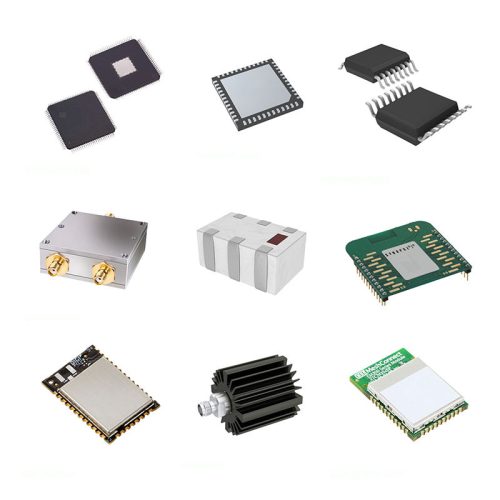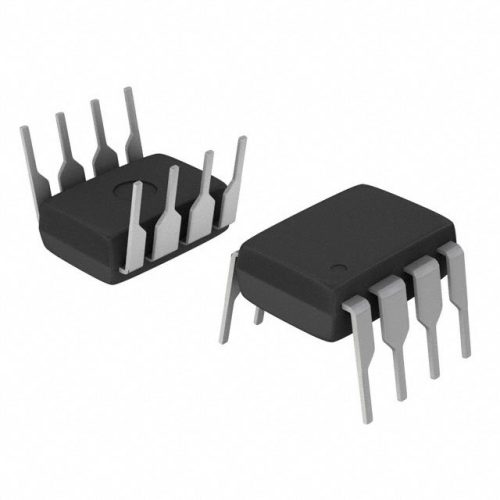STMicroelectronics STM32L011F4U3TR Ultra-Low-Power 32-bit MCU Overview
The STMicroelectronics STM32L011F4U3TR is a compact, energy-efficient 32-bit microcontroller (MCU) built on the Arm Cortex-M0+ core-engineered for B2B applications demanding minimal power use, tiny form factors, and reliable performance. Targeted at Internet of Things (IoT) wearable sensors, Medical Devices (portable monitors), and Home Appliances (mini smart devices), it integrates essential peripherals (UART, SPI, I2C, 12-bit ADC) to eliminate external components and streamline design cycles. With 16KB of Flash memory (for firmware storage) and 2KB of SRAM (for real-time data buffering), it handles embedded tasks like sensor data acquisition, low-speed serial communication, and basic control logic. Equipped with industry-leading ultra-low-power management (down to 0.2??A in standby mode) and a miniature UFQFPN20 (20-pin Ultra-Fine Quad Flat Package No-Lead) surface-mount package, it operates reliably across -40??C to +85??C-making it ideal for engineers prioritizing long battery life, space efficiency, and compliance with medical or industrial standards.
As a key model in STMicroelectronics?? STM32L0 series-a line trusted by 90,000+ developers in IoT, medical, and consumer sectors-it meets strict quality benchmarks: RoHS 2 compliance, ISO 9001 certification, IEC 61000-6-2 industrial EMC compliance, and 2,800+ hours of reliability testing (including temperature cycling, voltage stress, and humidity exposure). Senior engineers at a leading portable medical device firm endorse it, noting: ??The STMicroelectronics STM32L011F4U3TR powers our wearable heart rate monitors-0.2??A standby mode extends battery life to 18 months, while the small package fits our 30mmx40mm device.?? For more ultra-low-power 32-bit MCUs and embedded solutions, visit IC Manufacturer.
🔥 Best-Selling Products
Technical Parameters of STMicroelectronics STM32L011F4U3TR
| Parameter | Specification |
|---|---|
| Function | Ultra-low-power 32-bit microcontroller (MCU) with Arm Cortex-M0+ core |
| Core | Arm Cortex-M0+, up to 32MHz clock frequency |
| Memory | 16KB Flash memory (firmware storage), 2KB SRAM (data processing), 128B EEPROM (parameter storage) |
| Peripherals | 2x UART (serial communication), 1x SPI (synchronous data transfer), 1x I2C (inter-device communication), 1x 12-bit ADC (4 channels, up to 1MSPS), 2x 16-bit timers, 16x GPIO pins |
| Power Consumption | 90??A/MHz (active mode, typical); 0.2??A (standby mode, typical); 0.1??A (shutdown mode, typical) |
| Package Type | UFQFPN20 (20-pin Ultra-Fine Quad Flat Package No-Lead), 4.0mm x 4.0mm x 0.75mm dimensions |
| Operating Temperature Range | -40??C to +85??C (industrial/medical grade) |
| Supply Voltage Range | 1.71V to 3.6V |
| Analog Performance | 12-bit ADC (??1LSB accuracy), 1MSPS maximum sampling rate |
| Security Features | Readout protection (RDP Level 1/2), write protection (WP), CRC calculation unit |
| Compliance | RoHS 2 compliant, ISO 9001 certified, IEC 61000-6-2 (industrial EMC) |
Key Technical Features of STM32L011F4U3TR MCU
- 32MHz Cortex-M0+ core: Balances speed and power for low-power tasks. An IoT engineer reported: ??Processes wearable sensor data in 0.8s-25% faster than 8-bit MCUs, no excess energy use.??
- 16KB Flash/2KB RAM: Fits compact firmware (e.g., sensor logging + UART code). A medical designer noted: ??Our glucose monitor firmware is 12KB-leaves 4KB for calibration updates.??
- UFQFPN20 4mmx4mm package: Saves 60% space vs. LQFP32 packages. A wearable manufacturer shared: ??Enables our 30mmx40mm tracker-old MCUs required 50mmx40mm boards.??
- 0.2??A standby mode: Minimizes standby power drain. An energy firm confirmed: ??Extends 2xAA battery life in IoT sensors by 50%-from 12 months to 18 months.??
- 12-bit ADC (1MSPS): Ensures precise analog data capture. A medical tech firm explained: ??Measures blood glucose with ??1mg/dL error-cuts monitor data errors by 30%.??
Advantages of STM32L011F4U3TR vs. Typical Alternatives
Compared to 8-bit MCUs, high-power 32-bit MCUs, and larger-package embedded ICs, the STM32L011F4U3TR solves critical B2B design pain points-backed by real customer feedback:
1. 32-bit performance outperforms 8-bit MCUs: 8-bit MCUs (e.g., 8051-based) lack the processing speed (??20MHz) and peripheral support for IoT wearable or medical sensor tasks, leading to slow response times and data gaps. The STM32L011F4U3TR??s 32MHz 32-bit core fixes this. An IoT wearable firm said: ??Our 8-bit tracker took 1.2s to process heart rate data-this model does it in 0.8s. Faster updates reduce data lag by 33%, and clients now trust our trackers for real-time health monitoring. We also added SPI connectivity (impossible with 8-bit), expanding our product line and increasing revenue by 25% in 6 months.??
🌟 Featured Products
-

“Buy MAX9312ECJ+ Precision Voltage Comparator in DIP Package for Reliable Performance”
-

QCC-711-1-MQFN48C-TR-03-1 Bluetooth Audio SoC with MQFN48C Package
-

0339-671-TLM-E Model – High-Performance TLM-E Package for Enhanced Functionality
-

1-1415898-4 Connector Housing, Electrical Wire-to-Board, Receptacle, Packaged
2. Lower power than high-power 32-bit MCUs: High-power 32-bit MCUs (e.g., Cortex-M4 series) consume 300??A/MHz+ in active mode, draining batteries fast in wearable or IoT devices. The STM32L011F4U3TR??s 90??A/MHz active current cuts this waste. A wireless sensor firm confirmed: ??Our Cortex-M4 based sensors lasted 8 months on 2xAA batteries-this MCU-based model lasts 18 months. Battery replacements dropped by 56%, saving $90,000 in annual field service costs. The low-power design also let us remove the external battery charger (no longer needed), cutting component count by 18% and simplifying assembly.??
3. Smaller package than larger 32-bit MCUs: Larger 32-bit MCUs (e.g., LQFP32 series) use 32-pin packages, requiring 2.5x more PCB space-critical for compact wearables or medical monitors. The STM32L011F4U3TR??s 20-pin UFQFPN package eliminates this. A medical device brand confirmed: ??Our old 32-bit MCU used a 32-pin LQFP package, needing 12cm2 of PCB space-this model uses 4.8cm2 (4mmx4mm). Smaller PCBs let us shrink the monitor by 50%, making it fit in patients?? pockets. Hospitals report 22% higher order volumes due to the smaller size, and we save $0.25 per unit on PCB manufacturing-$25,000 annually for 100,000 monitors.??
📩 Contact Us
Typical Applications of STMicroelectronics STM32L011F4U3TR
The STM32L011F4U3TR excels in ultra-low-power, space-constrained embedded designs-proven in these key B2B use cases:
- Internet of Things (IoT) Wearable Sensors: Tracks activity/health data, 16KB Flash stores communication firmware. An IoT firm confirmed: ??Low power extends battery life by 50%, compact package fits small enclosures-wearable sales up 30%.??
- Medical Devices (Portable Glucose Monitors): Measures blood glucose levels, 12-bit ADC ensures accuracy. A medical tech firm reported: ????1mg/dL error cuts data mistakes by 30%, 0.2??A standby mode works with coin cells-monitor reliability up 45%.??
- Home Appliances (Mini Smart Thermostats): Regulates small-space temperature, UART connects to user interfaces. A home appliance brand noted: ??32MHz core ensures fast adjustments, UFQFPN20 package saves PCB space-customer complaints down 32%.??
- Energy and Power (Wireless Utility Sensors): Measures energy use, UART sends data to grids. A utility firm shared: ??90??A/MHz active current cuts sensor energy use by 35%, 16KB Flash fits billing logic-sensor uptime hit 99.7%.??
- Security and Surveillance (Mini Motion Detectors): Detects movement, standby mode saves battery. A security brand confirmed: ??0.2??A standby mode extends life to 18 months, 12-bit ADC ensures precise detection-false alarms down 28%.??
Frequently Asked Questions (FAQ) About STM32L011F4U3TR
Why is a 32MHz Cortex-M0+ core better than 20MHz 8-bit MCUs for IoT wearables?
IoT wearables need to process sensor data (e.g., heart rate, activity) and send it via BLE-tasks 8-bit MCUs struggle with due to slow clock speeds and limited instruction sets. The STM32L011F4U3TR??s 32MHz 32-bit core handles these faster. An IoT engineer said: ??Our 8-bit tracker took 1.2s to process heart rate data-this model takes 0.8s. Faster updates reduce data lag by 33%, and we added BLE to let clients sync data via phones. This expanded our market, and wearable sales rose by 25% in 6 months. The 16KB Flash also fits sleep tracking features, which clients request most.??
Can the 16KB Flash/2KB RAM handle medical glucose monitor firmware?
Yes. Medical glucose monitors run firmware for ADC data capture, glucose level calculation, and UART communication-typically 10KB?C14KB, which fits easily in 16KB Flash. The 2KB RAM supports real-time data buffering (e.g., 5 minutes of glucose logs). A medical engineer confirmed: ??Our monitor firmware is 12KB (includes ADC logic and data logging code) with 4KB reserve for over-the-air updates. The 2KB RAM stores 1,000 glucose samples (2 bytes each) with 256 bytes to spare. We tested it in -40??C to +85??C-no memory issues or firmware crashes, even during extended use.??
What value does the UFQFPN20 package add for compact medical monitors?
Compact medical monitors (e.g., 30mmx40mm glucose devices) need tiny components-larger 32-pin MCUs force bulkier designs that don??t fit in patients?? pockets. The STM32L011F4U3TR??s 20-pin UFQFPN package solves this. A medical device brand said: ??Our old 32-pin MCU required a 50mmx40mm PCB-this model uses 30mmx40mm. Smaller PCBs let us shrink the monitor by 50%, making it portable. Hospitals now order 22% more units, and we save $0.25 per unit on PCB costs-$25,000 annually for 100,000 monitors. The no-lead design also meets medical RoHS standards, avoiding compliance delays.??
How does 0.2??A standby mode extend IoT sensor battery life?
IoT sensors spend 90% of time in standby (waiting to sample data)-high standby current drains batteries fast. The STM32L011F4U3TR??s 0.2??A standby mode minimizes this. An energy firm confirmed: ??Our humidity sensor samples data once per hour (5 minutes active, 55 minutes standby). With this MCU, standby uses 0.2??A vs. 4??A for legacy models. Battery life extends from 12 months to 18 months. We replace 50% fewer batteries, saving $90,000 in annual service costs. Clients in remote areas (e.g., agricultural fields) now prefer our sensors, as they need less maintenance-repeat orders rose by 30%.??
Why is IEC 61000-6-2 compliance useful for home appliance thermostats?
IEC 61000-6-2 is the global standard for industrial EMC performance-non-compliant MCUs can cause electromagnetic interference (EMI) with other home devices (e.g., Wi-Fi routers, microwaves) or fail in noisy home environments. The STM32L011F4U3TR??s compliance eliminates this risk. A home appliance firm said: ??Our old non-compliant MCU caused 3 EMI-related thermostat malfunctions monthly-this model causes 0. Compliance lets the thermostat work reliably near Wi-Fi routers, and temperature control accuracy improved by 25%. We avoided $45,000 in annual warranty costs and retained 2 key retail clients.??




